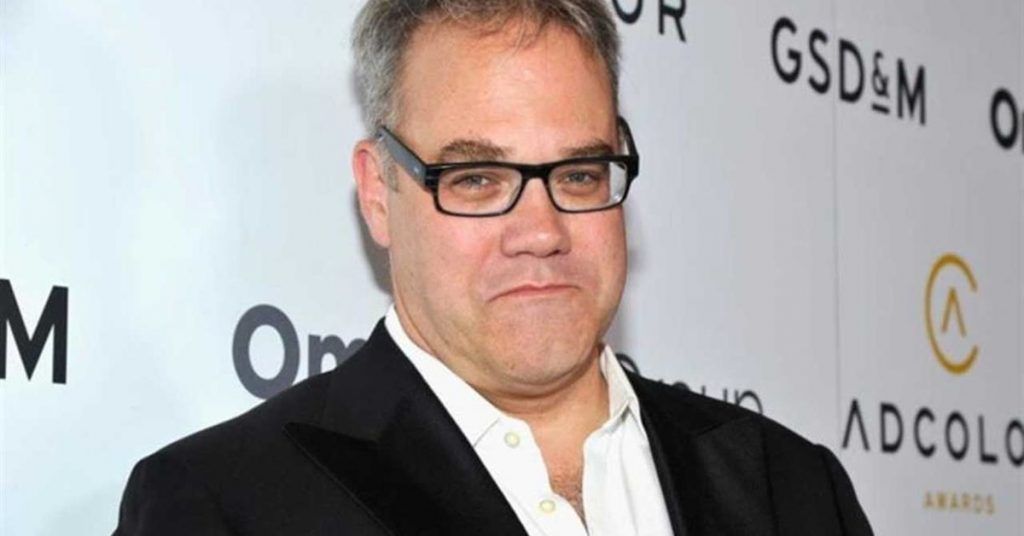A year and a half after he was fired from his post, the disgraced industry vet Ted Royer resurfaces in public eye to share his side of the story and express remorse.
More than a year-and-a-half after he was fired from Droga5 following allegations posted by anonymous Instagram account Diet Madison Avenue, former New York Chief Creative Officer Ted Royer reemerged in the public eye yesterday.
Royer spoke in Las Vegas at the London International Awards’ Creative Liaisons, the award show’s program dedicated to nurturing rising advertising talents.
“I’m here because I believe in face-to-face communication and I don’t want to hide any more,” he told a conference room full of the program’s young global creatives, as well as a number of the top industry execs serving as LIA jurors, some who paused their all-day judging sessions to hear him speak.
From 2012 until his widely-publicized split from Droga5, he had been a regular speaker at Creative Liaisons. His previous presentations had centered on advice for promising talents as they progress in their careers. In this hour-plus long session, he continued to share advice, but also took the opportunity to open up about his own experiences during and after the DMA allegations that appeared on social media.
“My agenda today is going to be about events that happened that got me to leave Droga5, that got me fired, and I want to tell you those because I want to put them in context for the year-and-a-half that followed, and the things I’ve come to know and believe since then that I feel have led to a stronger life,” Royer said.
Prior to this, none of the creatives who had been accused of misconduct in DMA social posts have spoken publicly at length about their experiences—though at least in one instance, former Martin Agency CCO Joe Alexander, did issue a statement saying that DMA’s actions that took away his “good name” without giving him a chance to defend himself, as part of a lawsuit he filed last month against the individuals behind the anonymous account.
“We live in a country that has due process and laws that allow an accused the right to face their accuser,” said LIA Founder and President Barbara Levy on why she invited Royer to return to speak. “I do not believe that an anonymous social media platform that does not allow the accused to respond should be allowed to indict, try and convict anyone.”

DMA Allegations
Royer, noticeably uneasy at times, thanked the audience. “I really want to acknowledge the Liaisons, the young creatives who don’t know me but may know me by my reputation, both good and recently horrible,” he said. “I thank you very much and I want to acknowledge you for listening and giving me a chance today.”
He then spent the opening portion of his speech addressing the posts and statements DMA had made prior to his departure from Droga5. Slide by slide, he went through the various allegations, including one post that placed his name at the top of a list of other alleged harassers in the industry.

“That was the worst day of my life by far,” he said. He had been in L.A. on a shoot, accompanied by his family, when he first saw the post. “It was early 2018 and I think all of you remember the atmosphere, we were waiting to oust sexual harassers everywhere and I find myself at the top. It was a brutal day.”
Another series of Diet Madison Avenue posts centered on how nondisclosure agreements help to silence women and protect powerful men in the ad industry.

“I read this on the way to work,” he said. “And I had two reactions. One was, ‘This is absolutely not true.’ I have never been involved in an NDA with a woman. I have never been involved in a discussion about any woman’s career relating to anything personal about me ever….I was actually happy when I saw that. I was like, ‘Oh, this is demonstrably false.’ But when I got to work, I could see the impact it had on people’s faces.”
He said the agency soon placed him on leave and hired a law firm to investigate him. “I don’t know if you know what happens when these law firms investigate you,” he said. “They go through every single communication about you they can find—emails to you and from you, G-chats to you and from you and about you.”
Royer then went on to reveal some of the behaviors the investigation uncovered, details that had never been included in previous reports around his firing. “I was flippant, I made jokes, I was flirty, I encouraged drinking and drug use,” he said. “And I believed the old creative douche bag rock star notion that you have to party really hard and do great work to be someone of notice in this industry. I certainly behaved selfishly and immaturely.”
Royer presented a final DMA slide, arguably the most damning, in which a person claiming to be one of his subordinates detailed a purported non-consensual encounter.

“This is a story, reportedly about me attacking a girl in the hallway of the agency, tagging my clients,” he said, at this point visibly emotional. “They made it very, very hard to defend myself … I’ve talked to hundreds of people afterwards and a lot of people remembered this story and believed this story … This story is not true. If it is true, it’s not about me at all. At all. I never did act like this. But this stuck. This stuck to me like glue.”
Royer said afterwards, more calls to investigate him and for employees to come forward went out. “I think a couple people did, I don’t know how many, and I was fired,” he said. “I don’t know what they said. I was not told anything. I was never given any chance to address those concerns. And I was pretty devastated.”
News reports around the investigation, and then his subsequent firing, never revealed why Royer was terminated. The agency only issued a single statement: “We are committed to maintaining a safe and inclusive environment for all our employees.”
Post-Droga5
For the rest of his talk, Royer revealed what he’s been doing since he left Droga5.
He said he spent the past year and a half having conversations with “hundreds” of people, men and women, about their relationships with him as well as their own experiences related to harassment. “It was incredibly eye-opening,” he said. “The MeToo movement is long overdue. It’s vital and necessary, and the women I know, including my wife [Suyin Sleeman, also an advertising creative] have had an awful time in this industry. The most common thing [I heard] was the 1,000 little cuts women feel every single day, things that remind them of their gender and their otherness.”
He also said he spent the time doing freelance work and focusing on “giving back,” including creating communications for an organization called the Freedom to Choose Project, which creates programmes to help better the lives of incarcerated individuals.
“I went into women’s prisons and spoke to them and the stories there are all startling similar,” he said. “One woman said she was passed around by her family members, which then leads to drugs and alcohol abuse, which then leads to falling into a bad crowd, often with an abusive man, which leads to a crime that gets them in jail.”
The programme, however, isn’t about just talking to the incarcerated, but talking “with them,” he says. “We do workshops where we are all equals and we learn just as much from them. One prisoner re-framed my relationship with my father in 20 minutes, and it blew me away.”
Royer said he’s been pursuing agency work as well. He described being up for a freelance gig at a small shop, but later found out that one woman there said, “We are not letting that monster in the building.”

“I reached out to her,” he said. “I met her for coffee and we talked for two hours. And I’m proud to say she’s a friend now. We text almost every day, we have raging debates on feminism and toxic masculinity and all that, but it is one of the best friendships I’ve had recently. It really solidified for me the power of face-to-face communication.”
In October of last year, reports came out that Royer had been quietly hired at DDB to work as a freelancer, which created a backlash against CEO Wendy Clark, who would ultimately step down as one of the leaders of the Time’s Up Advertising initiative.
“If you’re the young woman working at DDB and I walk in the door, of course you’re going to freak out,” he said. “Of course you’re going to freak out, and I understand that.”
The conversations and various projects he has had in the intervening year taught him the importance of three key things: “communication, understanding and empathy,” he says. “Three things I repeat to myself all the time now. Being an ad guy, of course, I noticed they form an anagram CUE.” Now, when something “shitty” happens, he says, “I go, that’s my CUE.’ I’m going to address the situation but approach it with communication, understanding and empathy. I think as a leader, it’s quite powerful. I wouldn’t necessarily do it before, but I absolutely do now.”
On DMA
When Ad Age asked Royer during the Q&A session if he believed anything good came out of what DMA did, he said, “The good that came out of it was we’re certainly far more aware of [harassment] as an industry, and that’s fantastic. It certainly started a lot of companies looking at what they’ve done, are doing, and that’s fantastic too. And I think the impetus behind Time’s Up Advertising came because of Diet Madison Avenue.”
The empathy he said he practices even extends to DMA. “I don’t think they’re horrible people,” he said. “I think everyone’s just trying to do the best they can with what they have. And I bet if I ever met someone from Diet Madison Avenue, they’re probably in a lot of pain. Anger comes from pain. I think their anger came from frustration and impotence, and so that’s made a lot of people very aware that there are people out there who don’t feel like they had a voice.” He added, “I would meet Diet Madison Avenue face-to-face and talk to them and hear their pain and hear where their anger came from.”
Apologies
“I don’t know anybody who’s accused me, but I want to,” Royer said. Numerous times throughout his presentation he encouraged the audience, or anyone who feels they’ve been wronged by him to reach out to him via email at TedRoyer50@gmail.com, and possibly, have a face-to-face conversation.
“If I’ve wronged somebody, I want to focus on them and right it,” he said. “Louis CK wronged people, and he hasn’t addressed it. I used to be a huge fan of his, but he hasn’t said a word, except about how much money he’s lost. That’s not addressing it. I think if you apply communication, understanding and empathy to people who’ve been through this, we can all learn a lot more.”

“I apologize to my wife, who’s stronger than I ever imagined,” he said. “I don’t like the way Droga5 handled me, but I love that company, and I loved it with all my heart and I apologize if I brought them any shame and hurt. And I apologize to the industry that I love. I’m one of your main villains right now, and that hurts so much because I love this industry, and I want to help this industry. I’m not here for absolution. I’m not here to say everything’s fine now, but I want this to be a beginning.”
Reactions
Attendees at the Liaisons had mixed reactions to Royer’s speech, and some were extremely strong. A number of female participants, visibly nervous, questioned Royer during the Q&A session, one asking his motivations for presenting at that time.
“It’s the first thing I’ve been invited to,” he said. “I wanted to talk to people I didn’t know. I wanted to talk to creatives because the things that I have learned and have embraced, and tried to embody over the last year-and-a-half I think are very relevant to young creatives. I wanted to level set and I really wanted to give back to this industry.”
Edelman Global CCO Judy John, one of the LIA jury presidents, said she wanted to take Royer up on his request for face-to-face conversations. “I want to push you on the ‘E’ in empathy because I think you need to understand that in the position of power that you have, what you do, what you say, has more [impact] than everyone else,” she said. “I think there is a lack of awareness about a little comment, like what you’re wearing, that is uncomfortable.”
One Liaisons member was upset by Royer’s responses to the DMA posts. “So you’re talking about empathy, but you’re also being upset that there were women saying this anonymously. The reason they’re saying this anonymously is because they’re afraid, and they’re losing their jobs,” she said.
LIA attendees who spoke to Ad Age and who commented on the workplace app Fishbowl expressed consternation and even anger at not being properly informed that Royer would be presenting. Their program had only listed “Guest Speaker” for the portion of his talk, and his name appeared on the online schedule only during the week of the event.
“It made no sense for him to be here, to inspire young creatives,” said one Liaison member. “I think it was really a big misstep for the program. I’m upset with the program for tricking us into listening to his speech. I’m more interested in LIAs being taken to task than [Royer] being taken to task.”
Another Liaisons participant was so agitated she had to leave the room during the presentation.
LIA founder Levy later stepped up to the podium to address the reactions.
“I didn’t want to make anybody uncomfortable. That was not the intention here at all,” Levy said before sharing with the audience her own experience of being sexually assaulted in 1983. “I know for some of you it was a tough thing to sit and listen to. It was not meant to be. What the intention was that anonymous social media should not be held as truth.”
Upon hearing about the LIA participant who left the room because of his talk, Royer grew upset. “I’m mortified,” he said. “I didn’t see it coming at all. I would love to make it up to that person any way I can. If there’s anything I can do, I will do it.”
source:https://adage.com
MARKETING Magazine is not responsible for the content of external sites.











